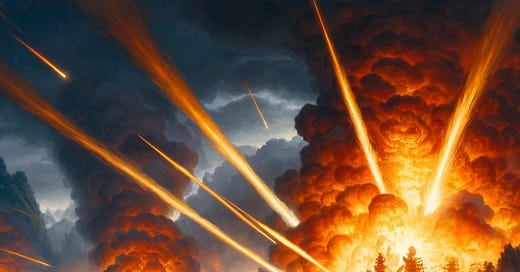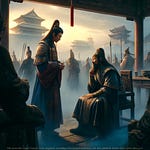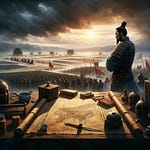Heaven signifies night and day, cold and heat, times and seasons.
This statement means that a skilled warrior must understand the patterns of the seasons, cold and heat, solar terms, and timely changes, and use favorable weather as a weapon. Many famous battles in history were influenced by the weather, including China's Battle of Red Cliffs and Napoleon's Battle of Waterloo. The former led to the establishment of the Three Kingdoms, and the latter ended Napoleon's Hundred Days.
The Battle of Red Cliffs, a famous battle in Chinese history, took place in 208 AD during the late Eastern Han dynasty. It was a confrontation between Cao Cao and the allied forces of Sun Quan and Liu Bei, ending in victory for the Sun-Liu alliance, significantly influencing the political landscape of the Three Kingdoms period.
The impact of weather on the Battle of Red Cliffs is as below:
1. Season and wind direction: The battle occurred in summer, a season historically marked by prevailing southeastern winds, crucial for the success of fire-based strategies.
2. Fire attack strategy: Zhou Yu and Zhuge Liang meticulously planned a fire attack, taking advantage of the southeastern wind to set Cao Cao's fleet ablaze.
3. Cao Cao's miscalculation: Cao Cao might have assumed that southeastern winds were unlikely in winter, leaving him unprepared for a potential fire attack.
4. Lake-land breeze phenomenon: The local weather featured lake-land breezes, with winds blowing from water to land during the day and the opposite at night. The fire attack was timed at night, exploiting this natural phenomenon.
The victory at Red Cliffs was not just a result of military strategy and valor but also exemplified precise understanding and utilization of weather conditions. The commanders of the Sun-Liu alliance demonstrated a profound grasp of local meteorological patterns and how to turn these into battlefield advantages, underscoring the critical role of weather in ancient warfare.
Napoleon's Battle of Waterloo, which occurred on June 18, 1815, is one of history's most famous military conflicts. It marked Napoleon's ultimate defeat and the victory of the Seventh Coalition, ending his Hundred Days' reign.
The impact of weather on the Battle of Waterloo is as below:
1. Eve of the battle: Heavy rain on June 17 turned the battlefield into a muddy mess, hampering the movement of Napoleon's artillery and affecting the French army's mobility.
2. Battlefield conditions: Continuous heavy rain transformed the battlefield into a quagmire, slowing down the infantry and cavalry, crucial since French tactics relied heavily on mobility and artillery support.
3. Tactical limitations: French artillery needed hard ground for maximum impact, but the muddy conditions at Waterloo reduced the effectiveness of their cannon fire.
4. Strategic delays: Bad weather delayed Napoleon's attack, allowing the allied forces more time to prepare and adjust their defenses. Additionally, French reinforcements were delayed by the muddy roads.
5. Global climate impact: Research suggests that the eruption of Indonesia’s Mount Tambora two months earlier might have caused abnormal weather in Europe, including the heavy rain during the battle, indirectly influencing the outcome.
Overall, the weather played a decisive role in the Battle of Waterloo, severely limiting French tactical execution and exacerbating the challenges faced by Napoleon's forces, ultimately leading to their defeat. This battle serves as a classic example of how weather can influence historical events.










Share this post